LAWS20058 - Australian Commercial Law: Legal Analysis & Cases
VerifiedAdded on 2023/06/07
|11
|3057
|247
Case Study
AI Summary
This assignment provides a comprehensive analysis of Australian Commercial Law, addressing various legal principles through case studies. It begins by examining a South African tribe's constitution and its compliance with Hart's three-part legal system, followed by a comparison of Nepal's and Australia's criminal justice systems, also analyzed through Hart's framework. The assignment then delves into specific legal issues, including a landlord's right to terminate a lease agreement for non-payment of rent, referencing the Gumland Property Holdings Pty Ltd v Duffy Bros Fruit Market case. Furthermore, it explores liability for misleading conduct under the Australian Consumer Law, citing the Fletcher v Nextra Australia Pty Ltd case. Finally, it discusses the enforceability of contractual terms, emphasizing the legal obligations of parties in a valid contract. This detailed analysis, contributed by a student, is available on Desklib, a platform offering study tools and resources for students.
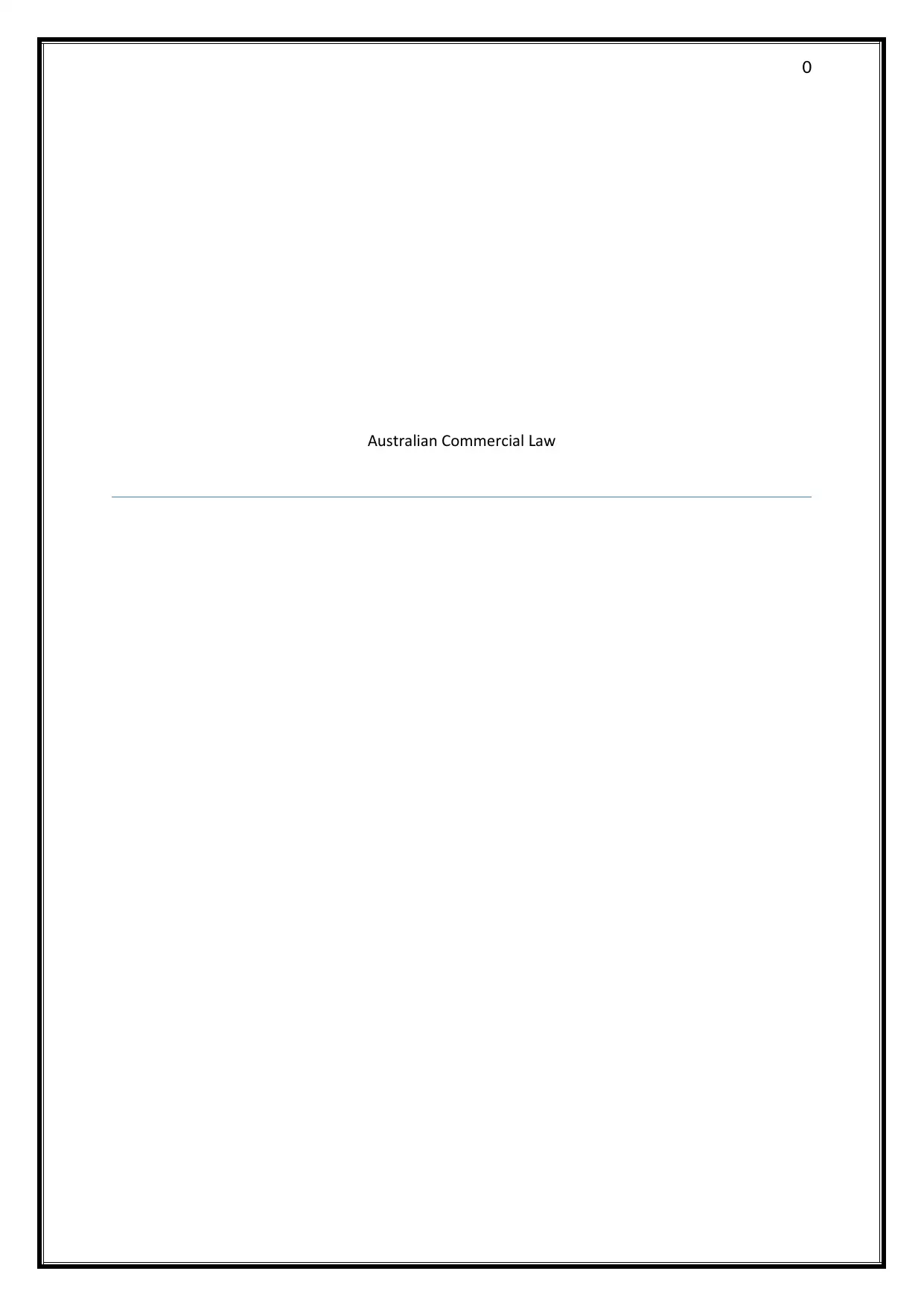
0
Australian Commercial awL
Australian Commercial awL
Paraphrase This Document
Need a fresh take? Get an instant paraphrase of this document with our AI Paraphraser
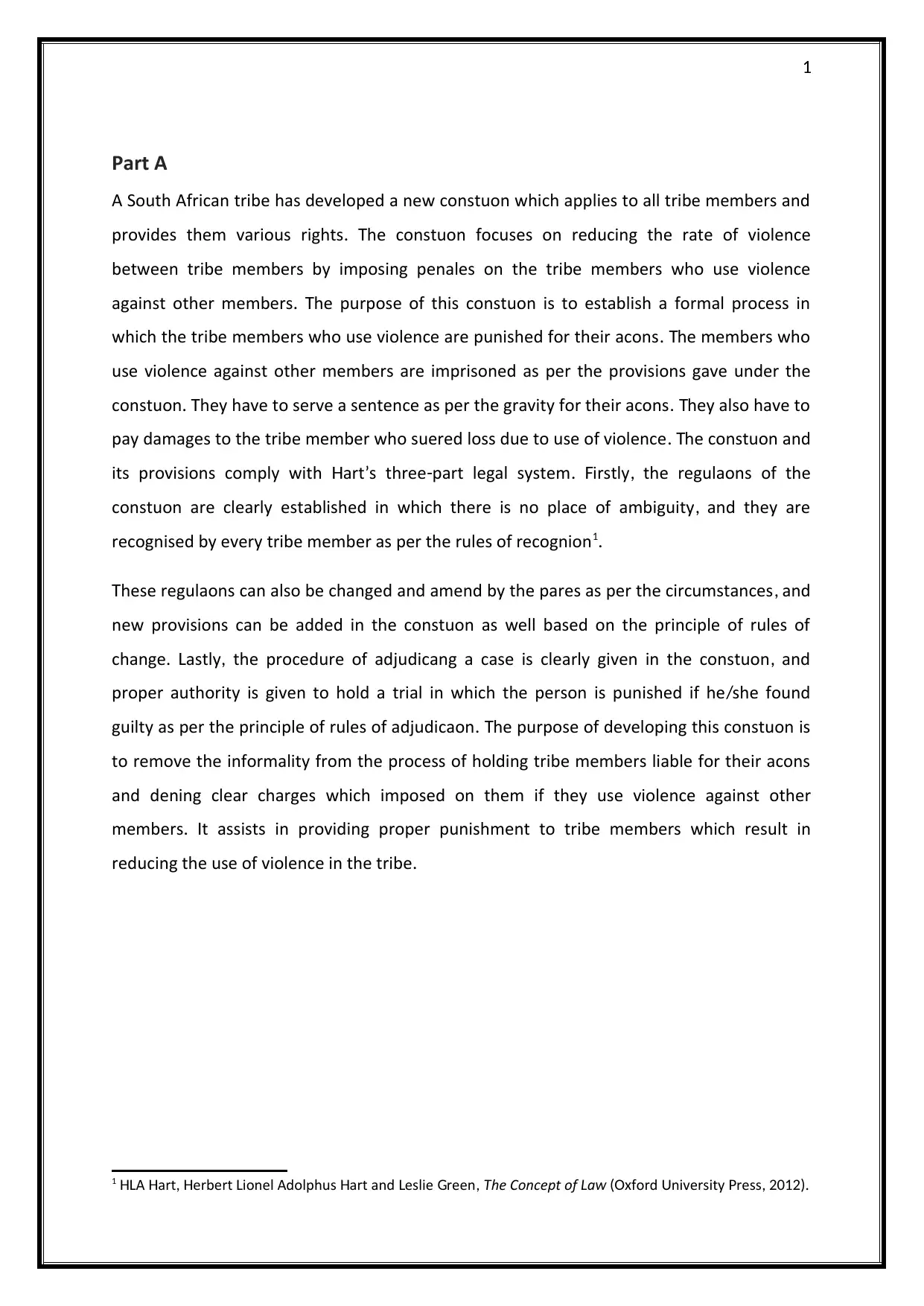
1
Part A
A South African tribe has developed a new constitution which applies to all tribe members and
provides them various rights he constitution focuses on reducing the rate of violence. T
between tribe members by imposing penalties on the tribe members who use violence
against other members he purpose of this constitution is to establish a formal process in. T
which the tribe members who use violence are punished for their actions he members who. T
use violence against other members are imprisoned as per the provisions gave under the
constitution hey have to serve a sentence as per the gravity for their actions hey also have to. T . T
pay damages to the tribe member who suffered loss due to use of violence he constitution and. T
its provisions comply with art s three part legal system irstly the regulations of theH ’ - . F ,
constitution are clearly established in which there is no place of ambiguity and they are,
recognised by every tribe member as per the rules of recognition1.
hese regulations can also be changed and amend by the parties as per the circumstances andT ,
new provisions can be added in the constitution as well based on the principle of rules of
change astly the procedure of adjudicating a case is clearly given in the constitution and. L , ,
proper authority is given to hold a trial in which the person is punished if he she found/
guilty as per the principle of rules of adjudication he purpose of developing this constitution is. T
to remove the informality from the process of holding tribe members liable for their actions
and defining clear charges which imposed on them if they use violence against other
members t assists in providing proper punishment to tribe members which result in. I
reducing the use of violence in the tribe.
1 A art erbert ionel Adolphus art and eslie reenHL H , H L H L G , he Concept of aT L w ford niversity ress(Ox U P , 2012).
Part A
A South African tribe has developed a new constitution which applies to all tribe members and
provides them various rights he constitution focuses on reducing the rate of violence. T
between tribe members by imposing penalties on the tribe members who use violence
against other members he purpose of this constitution is to establish a formal process in. T
which the tribe members who use violence are punished for their actions he members who. T
use violence against other members are imprisoned as per the provisions gave under the
constitution hey have to serve a sentence as per the gravity for their actions hey also have to. T . T
pay damages to the tribe member who suffered loss due to use of violence he constitution and. T
its provisions comply with art s three part legal system irstly the regulations of theH ’ - . F ,
constitution are clearly established in which there is no place of ambiguity and they are,
recognised by every tribe member as per the rules of recognition1.
hese regulations can also be changed and amend by the parties as per the circumstances andT ,
new provisions can be added in the constitution as well based on the principle of rules of
change astly the procedure of adjudicating a case is clearly given in the constitution and. L , ,
proper authority is given to hold a trial in which the person is punished if he she found/
guilty as per the principle of rules of adjudication he purpose of developing this constitution is. T
to remove the informality from the process of holding tribe members liable for their actions
and defining clear charges which imposed on them if they use violence against other
members t assists in providing proper punishment to tribe members which result in. I
reducing the use of violence in the tribe.
1 A art erbert ionel Adolphus art and eslie reenHL H , H L H L G , he Concept of aT L w ford niversity ress(Ox U P , 2012).
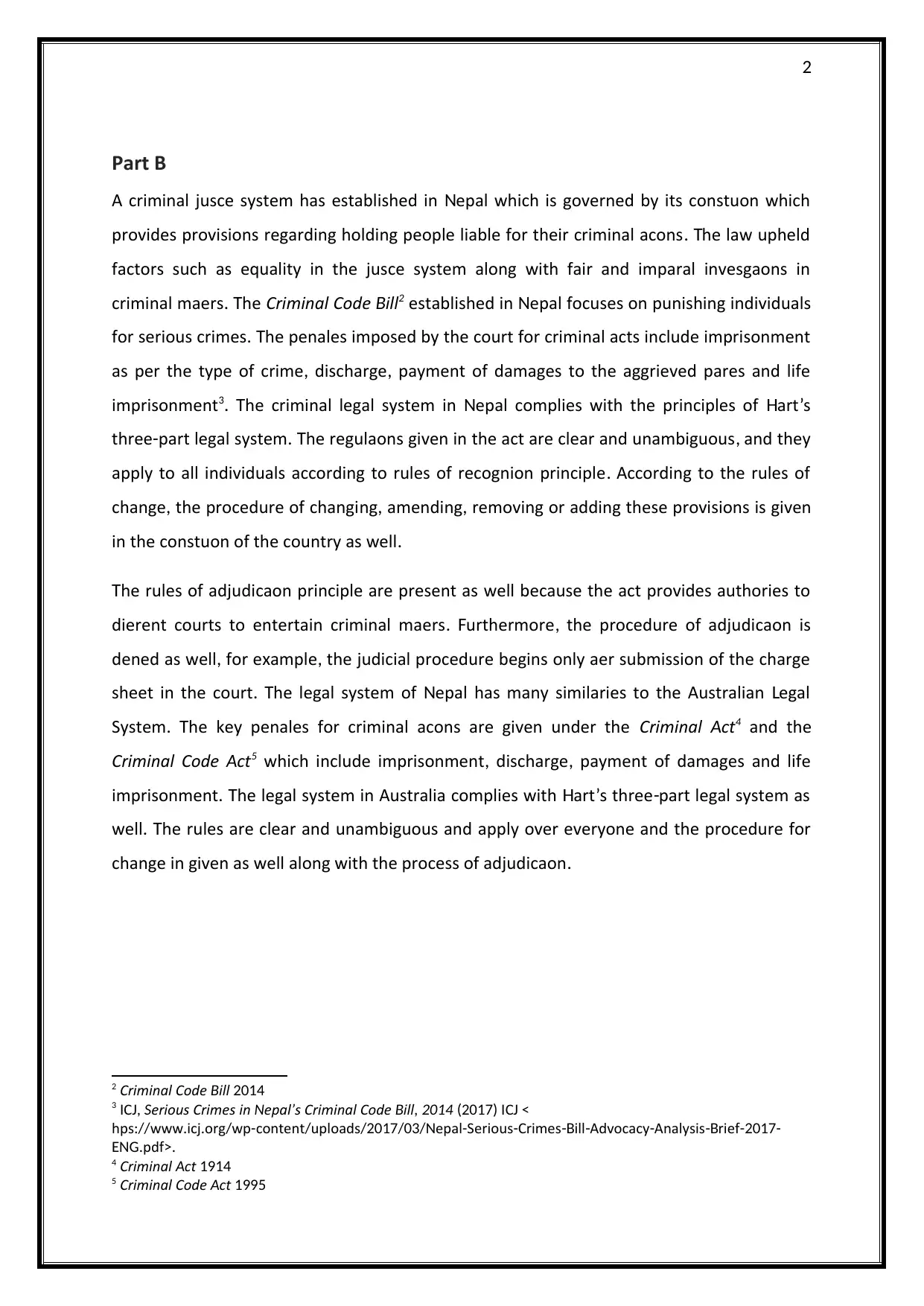
2
Part B
A criminal justice system has established in epal which is governed by its constitution whichN
provides provisions regarding holding people liable for their criminal actions he law upheld. T
factors such as equality in the justice system along with fair and impartial investigations in
criminal matters he. T Criminal Code illB 2 established in epal focuses on punishing individualsN
for serious crimes he penalties imposed by the court for criminal acts include imprisonment. T
as per the type of crime discharge payment of damages to the aggrieved parties and life, ,
imprisonment3 he criminal legal system in epal complies with the principles of art s. T N H ’
three part legal system he regulations given in the act are clear and unambiguous and they- . T ,
apply to all individuals according to rules of recognition principle According to the rules of.
change the procedure of changi, ng amending removing or adding these provisions is given, ,
in the constitution of the country as well.
he rules of adjudication principle are present as well because the act provides authorities toT
different courts to entertain criminal matters urthermore the procedure of adjudication is. F ,
defined as well for e ample the judicial procedure begins only after submission of the charge, x ,
sheet in the court he legal system of epal has many similarities to the Australian egal. T N L
System he key penalties for criminal actions are given under the. T Criminal ctA 4 and the
Criminal Code ctA 5 which include imprisonment discharge payment of damages and life, ,
imprisonment he legal system in Australia complies with art s three part legal system as. T H ’ -
well he rules are clear and unambiguous and apply over everyone and the procedure for. T
change in given as well along with the process of adjudication.
2 Criminal Code illB 2014
3 CI J, erious Crimes in epal s Criminal Code illS N ’ B , 2014 C(2017) I J <
https www icj org wp content uploads epal Serious Crimes ill Advocacy Analysis rief:// . . / - / /2017/03/N - - -B - - -B -2017-
pdfENG. >.
4 Criminal ctA 1914
5 Criminal Code ctA 1995
Part B
A criminal justice system has established in epal which is governed by its constitution whichN
provides provisions regarding holding people liable for their criminal actions he law upheld. T
factors such as equality in the justice system along with fair and impartial investigations in
criminal matters he. T Criminal Code illB 2 established in epal focuses on punishing individualsN
for serious crimes he penalties imposed by the court for criminal acts include imprisonment. T
as per the type of crime discharge payment of damages to the aggrieved parties and life, ,
imprisonment3 he criminal legal system in epal complies with the principles of art s. T N H ’
three part legal system he regulations given in the act are clear and unambiguous and they- . T ,
apply to all individuals according to rules of recognition principle According to the rules of.
change the procedure of changi, ng amending removing or adding these provisions is given, ,
in the constitution of the country as well.
he rules of adjudication principle are present as well because the act provides authorities toT
different courts to entertain criminal matters urthermore the procedure of adjudication is. F ,
defined as well for e ample the judicial procedure begins only after submission of the charge, x ,
sheet in the court he legal system of epal has many similarities to the Australian egal. T N L
System he key penalties for criminal actions are given under the. T Criminal ctA 4 and the
Criminal Code ctA 5 which include imprisonment discharge payment of damages and life, ,
imprisonment he legal system in Australia complies with art s three part legal system as. T H ’ -
well he rules are clear and unambiguous and apply over everyone and the procedure for. T
change in given as well along with the process of adjudication.
2 Criminal Code illB 2014
3 CI J, erious Crimes in epal s Criminal Code illS N ’ B , 2014 C(2017) I J <
https www icj org wp content uploads epal Serious Crimes ill Advocacy Analysis rief:// . . / - / /2017/03/N - - -B - - -B -2017-
pdfENG. >.
4 Criminal ctA 1914
5 Criminal Code ctA 1995
⊘ This is a preview!⊘
Do you want full access?
Subscribe today to unlock all pages.

Trusted by 1+ million students worldwide
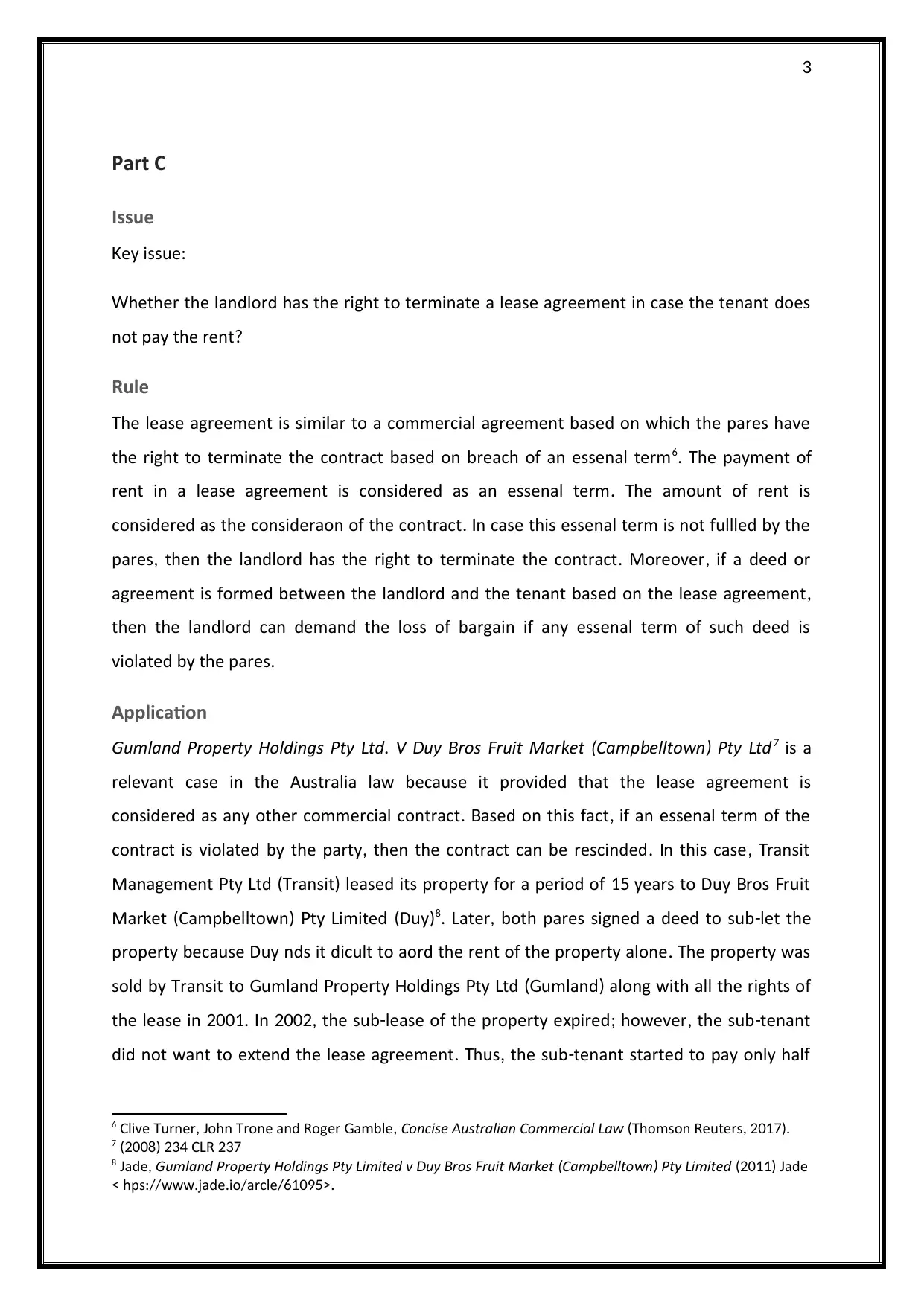
3
Part C
Issue
ey issueK :
hether the landlord has the right to terminate a lease agreement in case the tenant doesW
not pay the rent?
Rule
he lease agreement is similar to a commercial agreement based on which the parties haveT
the right to terminate the contract based on breach of an essential term6 he payment of. T
rent in a lease agreement is considered as an essential term he amount of rent is. T
considered as the consideration of the contract n case this essential term is not fulfilled by the. I
parties then the landlord has the right to terminate the contract Moreover if a deed or, . ,
agreement is formed between the landlord and the tenant based on the lease agreement,
then the landlord can demand the loss of bargain if any essential term of such deed is
violated by the parties.
Application
Gumland Property Holdings Pty td uffy ros ruit Mar et Camp ellto n Pty tdL . V D B F k ( b w ) L 7 is a
relevant case in the Australia law because it provided that the lease agreement is
considered as any other commercial contract ased on this fact if an essential term of the. B ,
contract is violated by the party then the contract can be rescinded n this case ransit, . I , T
Management ty td ransit leased its property for a period of years to Duffy ros ruitP L (T ) 15 B F
Market Campbelltown ty imited Duffy( ) P L ( )8 ater both parties signed a deed to sub let the. L , -
property because Duffy fi nds it difficult to afford the rent of the property alone he property was. T
sold by ransit to umland roperty oldings ty td umland along with all the rights ofT G P H P L (G )
the lease in n the sub lease of the property e pired however the sub tenant2001. I 2002, - x ; , -
did not want to e tend the lease agreement hus the sub tenant started to pay only halfx . T , -
6 Clive urner ohn rone and Roger ambleT , J T G , Concise ustralian Commercial aA L w homson Reuters(T , 2017).
7 C R(2008) 234 L 237
8 adeJ , Gumland Property Holdings Pty imited v uffy ros ruit Mar et Camp ellto n Pty imitedL D B F k ( b w ) L ade(2011) J
https www jade io article< :// . . / /61095>.
Part C
Issue
ey issueK :
hether the landlord has the right to terminate a lease agreement in case the tenant doesW
not pay the rent?
Rule
he lease agreement is similar to a commercial agreement based on which the parties haveT
the right to terminate the contract based on breach of an essential term6 he payment of. T
rent in a lease agreement is considered as an essential term he amount of rent is. T
considered as the consideration of the contract n case this essential term is not fulfilled by the. I
parties then the landlord has the right to terminate the contract Moreover if a deed or, . ,
agreement is formed between the landlord and the tenant based on the lease agreement,
then the landlord can demand the loss of bargain if any essential term of such deed is
violated by the parties.
Application
Gumland Property Holdings Pty td uffy ros ruit Mar et Camp ellto n Pty tdL . V D B F k ( b w ) L 7 is a
relevant case in the Australia law because it provided that the lease agreement is
considered as any other commercial contract ased on this fact if an essential term of the. B ,
contract is violated by the party then the contract can be rescinded n this case ransit, . I , T
Management ty td ransit leased its property for a period of years to Duffy ros ruitP L (T ) 15 B F
Market Campbelltown ty imited Duffy( ) P L ( )8 ater both parties signed a deed to sub let the. L , -
property because Duffy fi nds it difficult to afford the rent of the property alone he property was. T
sold by ransit to umland roperty oldings ty td umland along with all the rights ofT G P H P L (G )
the lease in n the sub lease of the property e pired however the sub tenant2001. I 2002, - x ; , -
did not want to e tend the lease agreement hus the sub tenant started to pay only halfx . T , -
6 Clive urner ohn rone and Roger ambleT , J T G , Concise ustralian Commercial aA L w homson Reuters(T , 2017).
7 C R(2008) 234 L 237
8 adeJ , Gumland Property Holdings Pty imited v uffy ros ruit Mar et Camp ellto n Pty imitedL D B F k ( b w ) L ade(2011) J
https www jade io article< :// . . / /61095>.
Paraphrase This Document
Need a fresh take? Get an instant paraphrase of this document with our AI Paraphraser
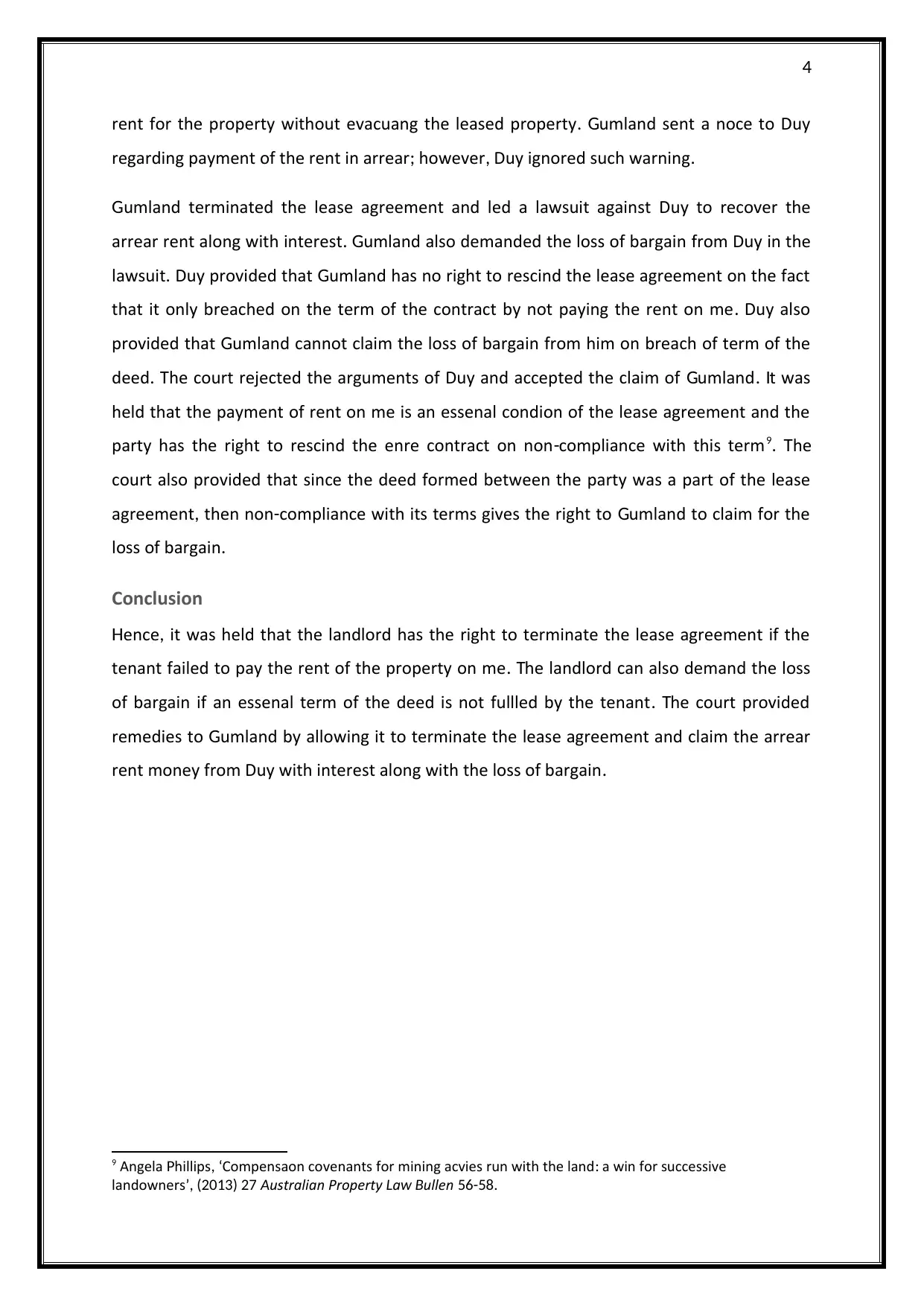
4
rent for the property without evacuating the leased property umland sent a notice to Duffy. G
regarding payment of the rent in arrear however Duffy ignored such warning; , .
umland terminated the lease agreement and fi led a lawsuit against Duffy to recover theG
arrear rent along with interest umland also demanded the loss of bargain from Duffy in the. G
lawsuit Duffy provided that umland has no right to rescind the lease agreement on the fact. G
that it only breached on the term of the contract by not paying the rent on ti me Duffy also.
provided that umland cannot claim the loss of bargain from him on breach of term of theG
deed he court rejected the arguments of Duffy and accepted the claim of umland t was. T G . I
held that the payment of rent on ti me is an essential condition of the lease agreement and the
party has the right to rescind the entire contract on non compliance with this term- 9 he. T
court also provided that since the deed formed between the party was a part of the lease
agreement then non compliance with its terms gives the right to umland to claim for the, - G
loss of bargain.
Conclusion
ence it was held that the landlord has the right to terminate the lease agreement if theH ,
tenant failed to pay the rent of the property on ti me he landlord can also demand the loss. T
of bargain if an essential term of the deed is not fulfilled by the tenant he court provided. T
remedies to umland by allowing it to terminate the lease agreement and claim the arrearG
rent money from Duffy with interest along with the loss of bargain.
9 Angela hillips Compensation covenants for mining activities run with the land a win for successiveP , ‘ :
landowners’, (2013) 27 ustralian Property a ulletinA L w B 56-58.
rent for the property without evacuating the leased property umland sent a notice to Duffy. G
regarding payment of the rent in arrear however Duffy ignored such warning; , .
umland terminated the lease agreement and fi led a lawsuit against Duffy to recover theG
arrear rent along with interest umland also demanded the loss of bargain from Duffy in the. G
lawsuit Duffy provided that umland has no right to rescind the lease agreement on the fact. G
that it only breached on the term of the contract by not paying the rent on ti me Duffy also.
provided that umland cannot claim the loss of bargain from him on breach of term of theG
deed he court rejected the arguments of Duffy and accepted the claim of umland t was. T G . I
held that the payment of rent on ti me is an essential condition of the lease agreement and the
party has the right to rescind the entire contract on non compliance with this term- 9 he. T
court also provided that since the deed formed between the party was a part of the lease
agreement then non compliance with its terms gives the right to umland to claim for the, - G
loss of bargain.
Conclusion
ence it was held that the landlord has the right to terminate the lease agreement if theH ,
tenant failed to pay the rent of the property on ti me he landlord can also demand the loss. T
of bargain if an essential term of the deed is not fulfilled by the tenant he court provided. T
remedies to umland by allowing it to terminate the lease agreement and claim the arrearG
rent money from Duffy with interest along with the loss of bargain.
9 Angela hillips Compensation covenants for mining activities run with the land a win for successiveP , ‘ :
landowners’, (2013) 27 ustralian Property a ulletinA L w B 56-58.
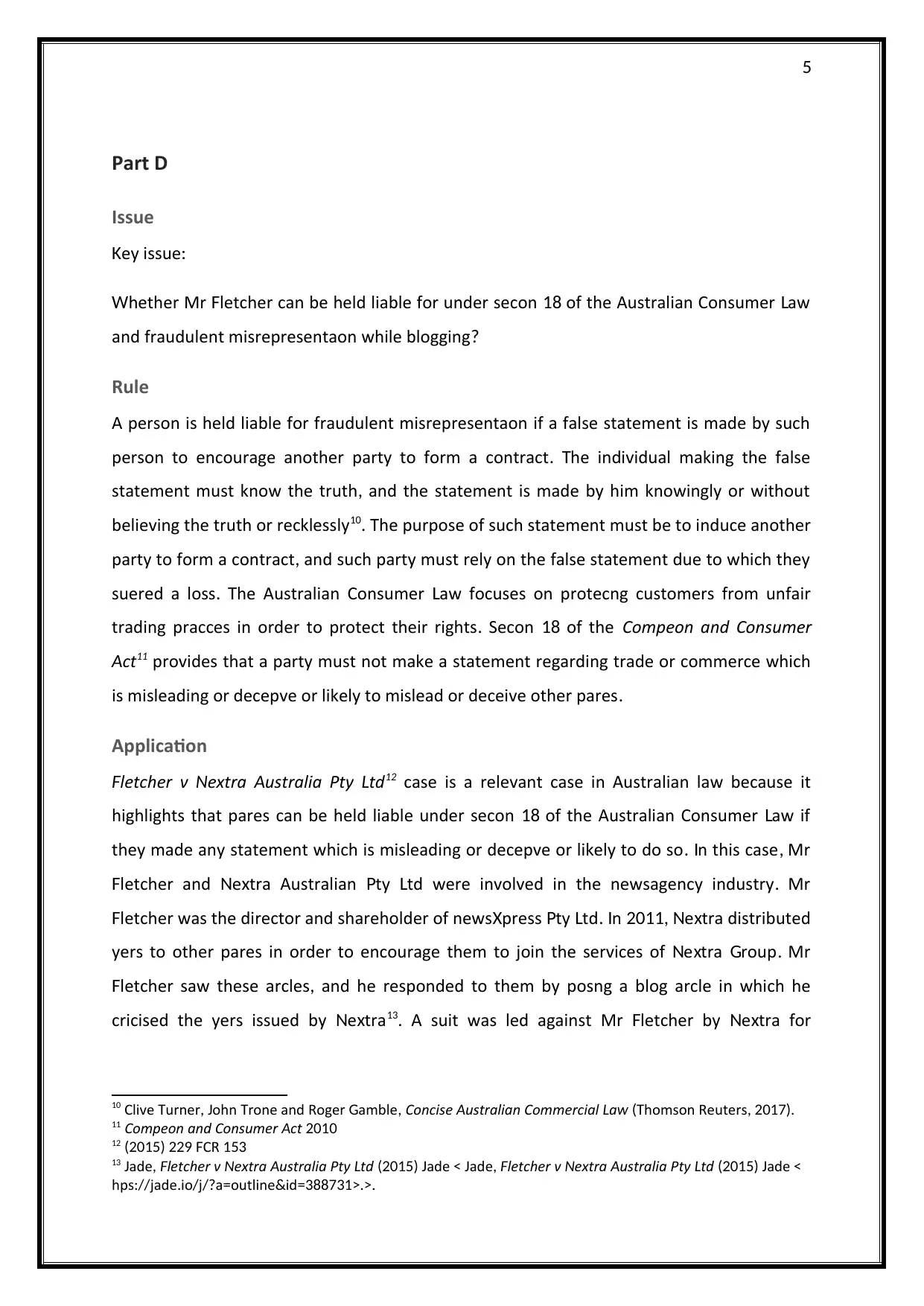
5
Part D
Issue
ey issueK :
hether Mr letcher can be held liable for under section of the Australian Consumer awW F 18 L
and fraudulent misrepresentation while blogging?
Rule
A person is held liable for fraudulent misrepresentation if a false statement is made by such
person to encourage another party to form a contract he individual making the false. T
statement must know the truth and the statement is made by him knowingly or without,
believing the truth or recklessly10 he purpose of such statement must be to induce another. T
party to form a contract and such party must rely on the false statement due to which they,
suffered a loss he Australian Consumer aw focuses on protecting customers from unfair. T L
trading practices in order to protect their rights Section of the. 18 Competition and Consumer
ctA 11 provides that a party must not make a statement regarding trade or commerce which
is misleading or deceptive or likely to mislead or deceive other parties.
Application
letcher v extra ustralia Pty tdF N A L 12 case is a relevant case in Australian law because it
highlights that parties can be held liable under section of the Australian Consumer aw if18 L
they made any statement which is misleading or deceptive or likely to do so n this case Mr. I ,
letcher and e tra Australian ty td were involved in the newsagency industry MrF N x P L .
letcher was the director and shareholder of news press ty td n e tra distributedF X P L . I 2011, N x
fl
yers to other parties in order to encourage them to join the services of e tra roup MrN x G .
letcher saw these articles and he responded to them by posting a blog article in which heF ,
criticised the fl yers issued by e traN x 13 A suit was fi led against Mr letcher by e tra for. F N x
10 Clive urner ohn rone and Roger ambleT , J T G , Concise ustralian Commercial aA L w homson Reuters(T , 2017).
11 Competition and Consumer ctA 2010
12 CR(2015) 229 F 153
13 adeJ , letcher v extra ustralia Pty tdF N A L ade ade(2015) J < J , letcher v extra ustralia Pty tdF N A L ade(2015) J <
https jade io j a outline id:// . / /? = & =388731>.>.
Part D
Issue
ey issueK :
hether Mr letcher can be held liable for under section of the Australian Consumer awW F 18 L
and fraudulent misrepresentation while blogging?
Rule
A person is held liable for fraudulent misrepresentation if a false statement is made by such
person to encourage another party to form a contract he individual making the false. T
statement must know the truth and the statement is made by him knowingly or without,
believing the truth or recklessly10 he purpose of such statement must be to induce another. T
party to form a contract and such party must rely on the false statement due to which they,
suffered a loss he Australian Consumer aw focuses on protecting customers from unfair. T L
trading practices in order to protect their rights Section of the. 18 Competition and Consumer
ctA 11 provides that a party must not make a statement regarding trade or commerce which
is misleading or deceptive or likely to mislead or deceive other parties.
Application
letcher v extra ustralia Pty tdF N A L 12 case is a relevant case in Australian law because it
highlights that parties can be held liable under section of the Australian Consumer aw if18 L
they made any statement which is misleading or deceptive or likely to do so n this case Mr. I ,
letcher and e tra Australian ty td were involved in the newsagency industry MrF N x P L .
letcher was the director and shareholder of news press ty td n e tra distributedF X P L . I 2011, N x
fl
yers to other parties in order to encourage them to join the services of e tra roup MrN x G .
letcher saw these articles and he responded to them by posting a blog article in which heF ,
criticised the fl yers issued by e traN x 13 A suit was fi led against Mr letcher by e tra for. F N x
10 Clive urner ohn rone and Roger ambleT , J T G , Concise ustralian Commercial aA L w homson Reuters(T , 2017).
11 Competition and Consumer ctA 2010
12 CR(2015) 229 F 153
13 adeJ , letcher v extra ustralia Pty tdF N A L ade ade(2015) J < J , letcher v extra ustralia Pty tdF N A L ade(2015) J <
https jade io j a outline id:// . / /? = & =388731>.>.
⊘ This is a preview!⊘
Do you want full access?
Subscribe today to unlock all pages.

Trusted by 1+ million students worldwide

6
breaching section of AC and making a fraudulent misrepresentation he court provided in18 L . T
its judgement that Mr letcher is liable under section for misleading and deceptive conductF 18 .
he blog posted by him erroneously asserted on the fact that the fl yer issued by e tra didT N x
not differentiate between those newsagencies that has entered into a contract for full service
of e tra roup and between those who have signed up for cheaper services which wereN x G
given by ews tra ranchise Mr letcher argued in this court that the opinion given byN Ex F . F
him in the blog was his own opinion regarding those fl yers however the court rejected this; ,
claim of Mr letcher Mr letcher also argued that the blog did not come into the definition ofF . F
trade and commerce owever the court provided that Mr letcher is at a key position in‘ ’. H , F
the industry and his previous blogs have been used for commercial purposes as well14 he. T
blog posted by him was clearly focused on attacking his customers in order to induce other
parties to terminate their services and join the services of news press ty td hus the courtX P L . T ,
held Mr letcher liable under section for making misleading and deceptive statementsF 18
regarding the fl yers of e tra and fraudulently misrepresented his followersN x .
Conclusion
ence Mr letcher held liable by the court for breaching section of the AustralianH , F 18
Consumer aw for making a misleading and deceptive statement while blogging he courtL . T
awarded remedies to e tra by ordering Mr letcher to pay all the costs to the companyN x F
along with other e pensesx .
14 ime aseT B , letcher v extra ustralia Pty td C C Misleading and eceptive Conduct in logsF N A L [2015] F AF 52: D B
ime ase https www ti mebase com au news A article html(2015) T B < :// . . . / /2015/ T237- . >.
breaching section of AC and making a fraudulent misrepresentation he court provided in18 L . T
its judgement that Mr letcher is liable under section for misleading and deceptive conductF 18 .
he blog posted by him erroneously asserted on the fact that the fl yer issued by e tra didT N x
not differentiate between those newsagencies that has entered into a contract for full service
of e tra roup and between those who have signed up for cheaper services which wereN x G
given by ews tra ranchise Mr letcher argued in this court that the opinion given byN Ex F . F
him in the blog was his own opinion regarding those fl yers however the court rejected this; ,
claim of Mr letcher Mr letcher also argued that the blog did not come into the definition ofF . F
trade and commerce owever the court provided that Mr letcher is at a key position in‘ ’. H , F
the industry and his previous blogs have been used for commercial purposes as well14 he. T
blog posted by him was clearly focused on attacking his customers in order to induce other
parties to terminate their services and join the services of news press ty td hus the courtX P L . T ,
held Mr letcher liable under section for making misleading and deceptive statementsF 18
regarding the fl yers of e tra and fraudulently misrepresented his followersN x .
Conclusion
ence Mr letcher held liable by the court for breaching section of the AustralianH , F 18
Consumer aw for making a misleading and deceptive statement while blogging he courtL . T
awarded remedies to e tra by ordering Mr letcher to pay all the costs to the companyN x F
along with other e pensesx .
14 ime aseT B , letcher v extra ustralia Pty td C C Misleading and eceptive Conduct in logsF N A L [2015] F AF 52: D B
ime ase https www ti mebase com au news A article html(2015) T B < :// . . . / /2015/ T237- . >.
Paraphrase This Document
Need a fresh take? Get an instant paraphrase of this document with our AI Paraphraser
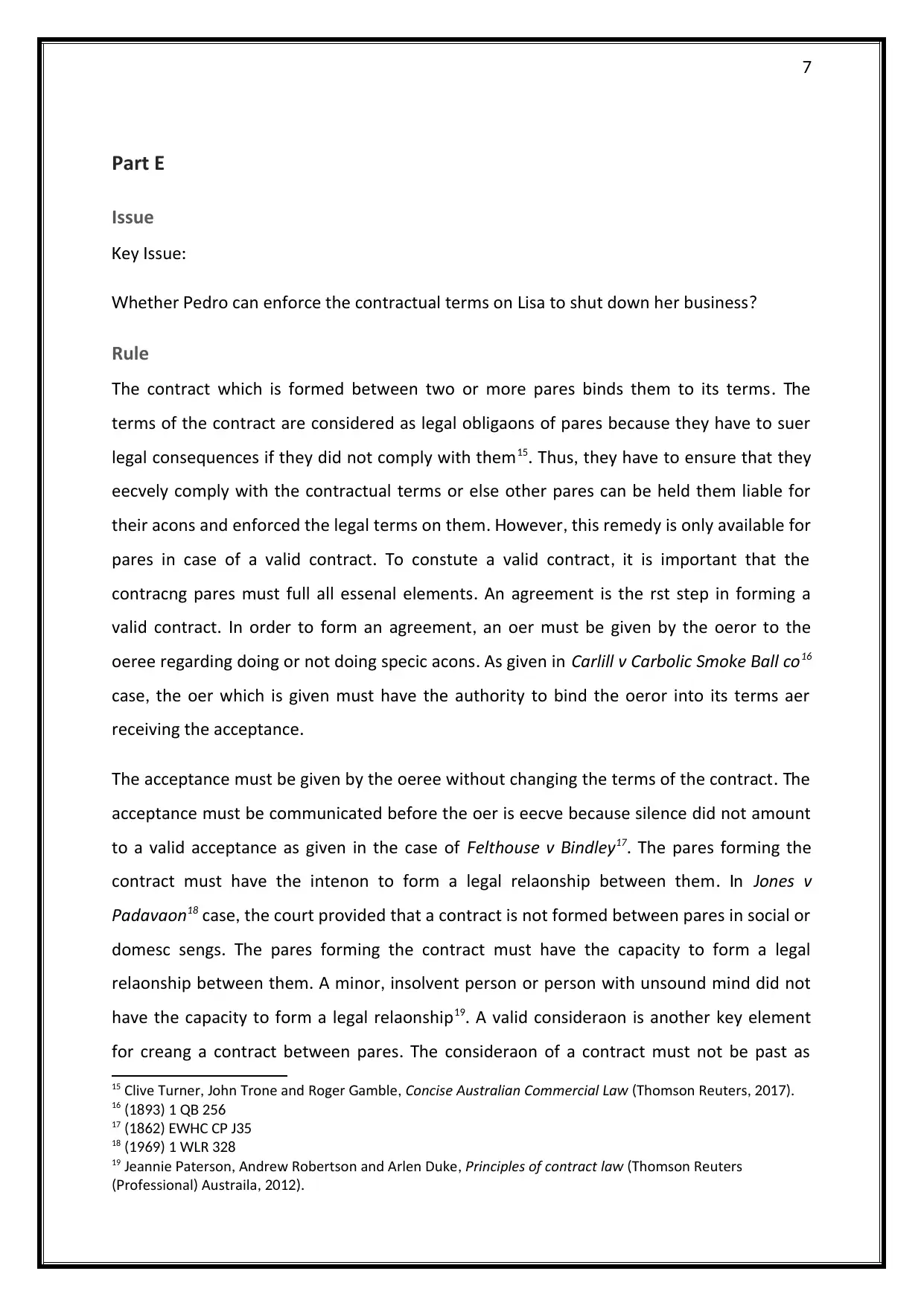
7
Part E
Issue
ey ssueK I :
hether edro can enforce the contractual terms on isa to shut down her businessW P L ?
Rule
he contract which is formed between two or more parties binds them to its terms heT . T
terms of the contract are considered as legal obligations of parties because they have to suffer
legal consequences if they did not comply with them15 hus they have to ensure that they. T ,
effectively comply with the contractual terms or else other parties can be held them liable for
their actions and enforced the legal terms on them owever this remedy is only available for. H ,
parties in case of a valid contract o constitute a valid contract it is important that the. T ,
contracting parties must fulfil all essential elements An agreement is the fi rst step in forming a.
valid contract n order to form an agreement an offer must be given by the offeror to the. I ,
offeree regarding doing or not doing specific actions As given in. Carlill v Car olic mo e all cob S k B 16
case the offer which is given must have the authority to bind the offeror into its terms after,
receiving the acceptance.
he acceptance must be given by the offeree without changing the terms of the contract heT . T
acceptance must be communicated before the offer is effective because silence did not amount
to a valid acceptance as given in the case of elthouse v indleyF B 17 he parties forming the. T
contract must have the intention to form a legal relationship between them n. I ones vJ
Padavatton18 case the court provided that a contract is not formed between parties in social or,
domestic settings he parties forming the contract must have the capacity to form a legal. T
relationship between them A minor insolvent person or person with unsound mind did not. ,
have the capacity to form a legal relationship19 A valid consideration is another key element.
for creating a contract between parties he consideration of a contract must not be past as. T
15 Clive urner ohn rone and Roger ambleT , J T G , Concise ustralian Commercial aA L w homson Reuters(T , 2017).
16 (1893) 1 QB 256
17 C C(1862) EWH P J35
18 R(1969) 1 WL 328
19 eannie aterson Andrew Robertson and Arlen DukeJ P , , Principles of contract law homson Reuters(T
rofessional Austraila(P ) , 2012).
Part E
Issue
ey ssueK I :
hether edro can enforce the contractual terms on isa to shut down her businessW P L ?
Rule
he contract which is formed between two or more parties binds them to its terms heT . T
terms of the contract are considered as legal obligations of parties because they have to suffer
legal consequences if they did not comply with them15 hus they have to ensure that they. T ,
effectively comply with the contractual terms or else other parties can be held them liable for
their actions and enforced the legal terms on them owever this remedy is only available for. H ,
parties in case of a valid contract o constitute a valid contract it is important that the. T ,
contracting parties must fulfil all essential elements An agreement is the fi rst step in forming a.
valid contract n order to form an agreement an offer must be given by the offeror to the. I ,
offeree regarding doing or not doing specific actions As given in. Carlill v Car olic mo e all cob S k B 16
case the offer which is given must have the authority to bind the offeror into its terms after,
receiving the acceptance.
he acceptance must be given by the offeree without changing the terms of the contract heT . T
acceptance must be communicated before the offer is effective because silence did not amount
to a valid acceptance as given in the case of elthouse v indleyF B 17 he parties forming the. T
contract must have the intention to form a legal relationship between them n. I ones vJ
Padavatton18 case the court provided that a contract is not formed between parties in social or,
domestic settings he parties forming the contract must have the capacity to form a legal. T
relationship between them A minor insolvent person or person with unsound mind did not. ,
have the capacity to form a legal relationship19 A valid consideration is another key element.
for creating a contract between parties he consideration of a contract must not be past as. T
15 Clive urner ohn rone and Roger ambleT , J T G , Concise ustralian Commercial aA L w homson Reuters(T , 2017).
16 (1893) 1 QB 256
17 C C(1862) EWH P J35
18 R(1969) 1 WL 328
19 eannie aterson Andrew Robertson and Arlen DukeJ P , , Principles of contract law homson Reuters(T
rofessional Austraila(P ) , 2012).
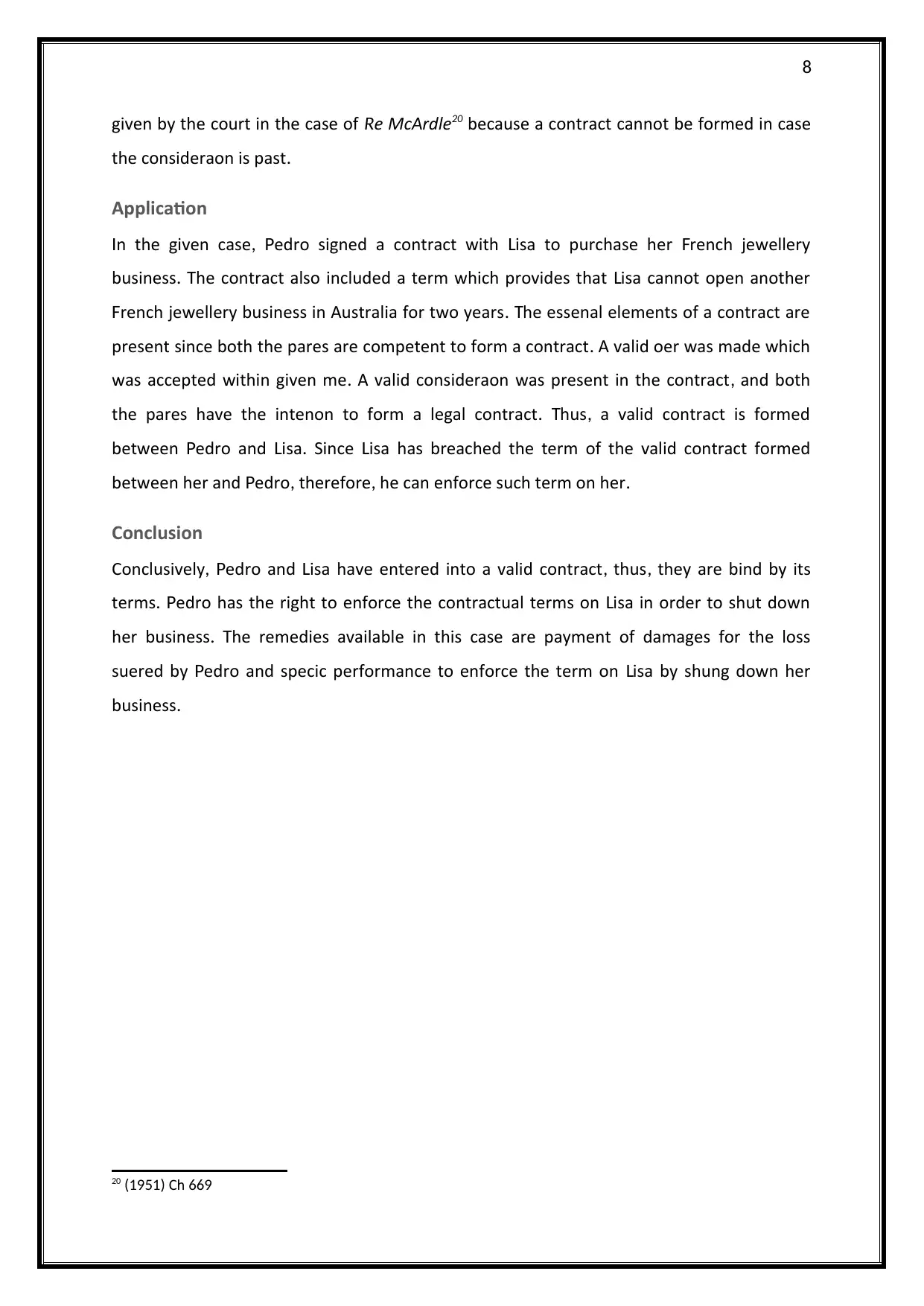
8
given by the court in the case of e Mc rdleR A 20 because a contract cannot be formed in case
the consideration is past.
Application
n the given case edro signed a contract with isa to purchase her rench jewelleryI , P L F
business he contract also included a term which provides that isa cannot open another. T L
rench jewellery business in Australia for two years he essential elements of a contract areF . T
present since both the parties are competent to form a contract A valid offer was made which.
was accepted within given ti me A valid consideration was present in the contract and both. ,
the parties have the intention to form a legal contract hus a valid contract is formed. T ,
between edro and isa Since isa has breached the term of the valid contract formedP L . L
between her and edro therefore he can enforce such term on herP , , .
Conclusion
Conclusively edro and isa have entered into a valid contract thus they are bind by its, P L , ,
terms edro has the right to enforce the contractual terms on isa in order to shut down. P L
her business he remedies available in this case are payment of damages for the loss. T
suffered by edro and specific performance to enforce the term on isa by shutting down herP L
business.
20 Ch(1951) 669
given by the court in the case of e Mc rdleR A 20 because a contract cannot be formed in case
the consideration is past.
Application
n the given case edro signed a contract with isa to purchase her rench jewelleryI , P L F
business he contract also included a term which provides that isa cannot open another. T L
rench jewellery business in Australia for two years he essential elements of a contract areF . T
present since both the parties are competent to form a contract A valid offer was made which.
was accepted within given ti me A valid consideration was present in the contract and both. ,
the parties have the intention to form a legal contract hus a valid contract is formed. T ,
between edro and isa Since isa has breached the term of the valid contract formedP L . L
between her and edro therefore he can enforce such term on herP , , .
Conclusion
Conclusively edro and isa have entered into a valid contract thus they are bind by its, P L , ,
terms edro has the right to enforce the contractual terms on isa in order to shut down. P L
her business he remedies available in this case are payment of damages for the loss. T
suffered by edro and specific performance to enforce the term on isa by shutting down herP L
business.
20 Ch(1951) 669
⊘ This is a preview!⊘
Do you want full access?
Subscribe today to unlock all pages.

Trusted by 1+ million students worldwide
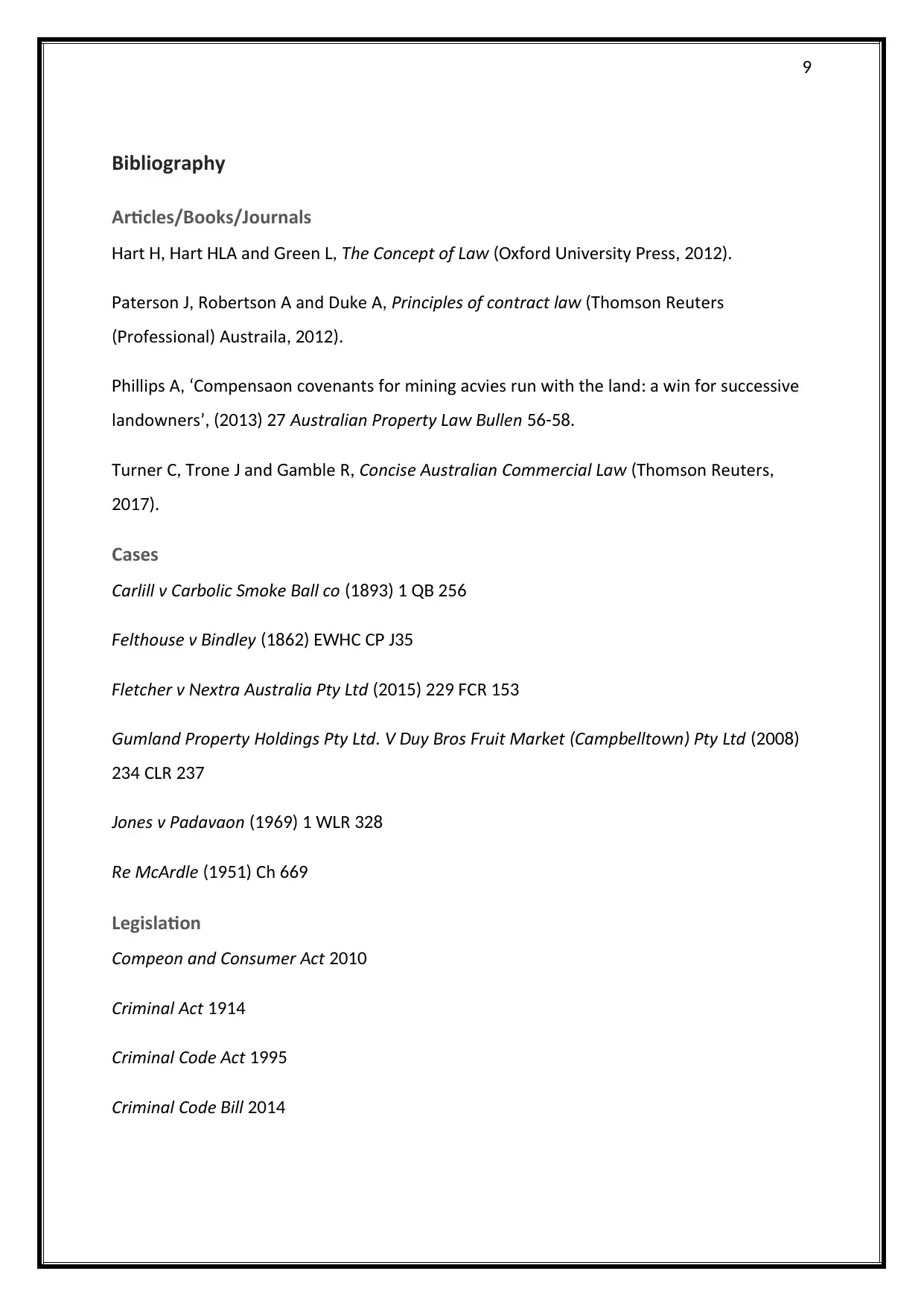
9
Bibliography
Articles/Books/Journals
art art A and reenH H, H HL G L, he Concept of aT L w ford niversity ress(Ox U P , 2012).
aterson Robertson A and Duke AP J, , Principles of contract law homson Reuters(T
rofessional Austraila(P ) , 2012).
hillips A Compensation covenants for mining activities run with the land a win for successiveP , ‘ :
landowners’, (2013) 27 ustralian Property a ulletinA L w B 56-58.
urner C rone and amble RT , T J G , Concise ustralian Commercial aA L w homson Reuters(T ,
2017).
Cases
Carlill v Car olic mo e all cob S k B (1893) 1 QB 256
elthouse v indleyF B C C(1862) EWH P J35
letcher v extra ustralia Pty tdF N A L CR(2015) 229 F 153
Gumland Property Holdings Pty td uffy ros ruit Mar et Camp ellto n Pty tdL . V D B F k ( b w ) L (2008)
C R234 L 237
ones v PadavattonJ R(1969) 1 WL 328
e Mc rdleR A Ch(1951) 669
Legislation
Competition and Consumer ctA 2010
Criminal ctA 1914
Criminal Code ctA 1995
Criminal Code illB 2014
Bibliography
Articles/Books/Journals
art art A and reenH H, H HL G L, he Concept of aT L w ford niversity ress(Ox U P , 2012).
aterson Robertson A and Duke AP J, , Principles of contract law homson Reuters(T
rofessional Austraila(P ) , 2012).
hillips A Compensation covenants for mining activities run with the land a win for successiveP , ‘ :
landowners’, (2013) 27 ustralian Property a ulletinA L w B 56-58.
urner C rone and amble RT , T J G , Concise ustralian Commercial aA L w homson Reuters(T ,
2017).
Cases
Carlill v Car olic mo e all cob S k B (1893) 1 QB 256
elthouse v indleyF B C C(1862) EWH P J35
letcher v extra ustralia Pty tdF N A L CR(2015) 229 F 153
Gumland Property Holdings Pty td uffy ros ruit Mar et Camp ellto n Pty tdL . V D B F k ( b w ) L (2008)
C R234 L 237
ones v PadavattonJ R(1969) 1 WL 328
e Mc rdleR A Ch(1951) 669
Legislation
Competition and Consumer ctA 2010
Criminal ctA 1914
Criminal Code ctA 1995
Criminal Code illB 2014
Paraphrase This Document
Need a fresh take? Get an instant paraphrase of this document with our AI Paraphraser
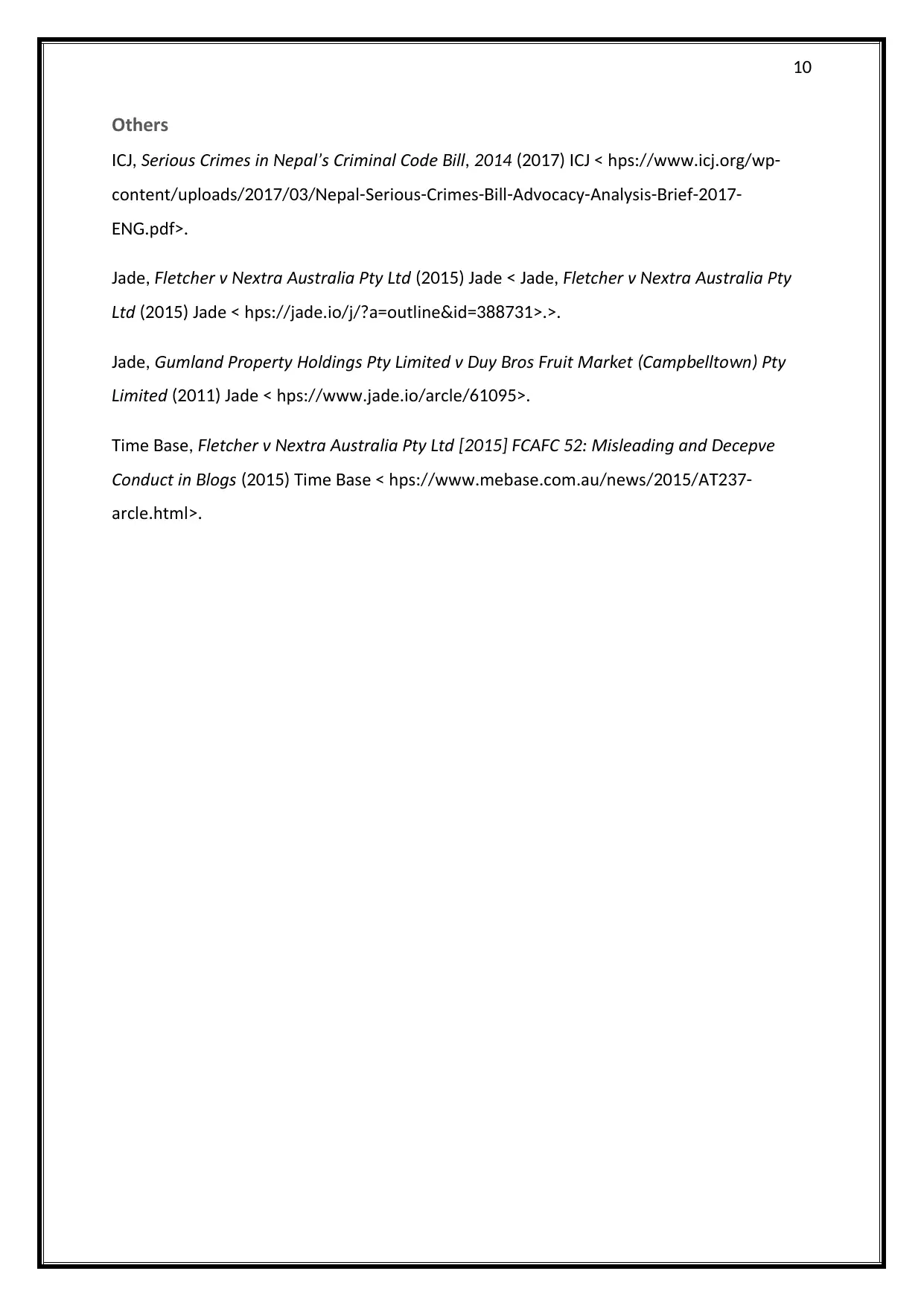
10
Others
CI J, erious Crimes in epal s Criminal Code illS N ’ B , 2014 C https www icj org wp(2017) I J < :// . . / -
content uploads epal Serious Crimes ill Advocacy Analysis rief/ /2017/03/N - - -B - - -B -2017-
pdfENG. >.
adeJ , letcher v extra ustralia Pty tdF N A L ade ade(2015) J < J , letcher v extra ustralia PtyF N A
tdL ade https jade io j a outline id(2015) J < :// . / /? = & =388731>.>.
adeJ , Gumland Property Holdings Pty imited v uffy ros ruit Mar et Camp ellto n PtyL D B F k ( b w )
imitedL ade https www jade io article(2011) J < :// . . / /61095>.
ime aseT B , letcher v extra ustralia Pty td C C Misleading and eceptiveF N A L [2015] F AF 52: D
Conduct in logsB ime ase https www ti mebase com au news A(2015) T B < :// . . . / /2015/ T237-
article html. >.
Others
CI J, erious Crimes in epal s Criminal Code illS N ’ B , 2014 C https www icj org wp(2017) I J < :// . . / -
content uploads epal Serious Crimes ill Advocacy Analysis rief/ /2017/03/N - - -B - - -B -2017-
pdfENG. >.
adeJ , letcher v extra ustralia Pty tdF N A L ade ade(2015) J < J , letcher v extra ustralia PtyF N A
tdL ade https jade io j a outline id(2015) J < :// . / /? = & =388731>.>.
adeJ , Gumland Property Holdings Pty imited v uffy ros ruit Mar et Camp ellto n PtyL D B F k ( b w )
imitedL ade https www jade io article(2011) J < :// . . / /61095>.
ime aseT B , letcher v extra ustralia Pty td C C Misleading and eceptiveF N A L [2015] F AF 52: D
Conduct in logsB ime ase https www ti mebase com au news A(2015) T B < :// . . . / /2015/ T237-
article html. >.
1 out of 11
Related Documents
Your All-in-One AI-Powered Toolkit for Academic Success.
+13062052269
info@desklib.com
Available 24*7 on WhatsApp / Email
![[object Object]](/_next/static/media/star-bottom.7253800d.svg)
Unlock your academic potential
Copyright © 2020–2026 A2Z Services. All Rights Reserved. Developed and managed by ZUCOL.



